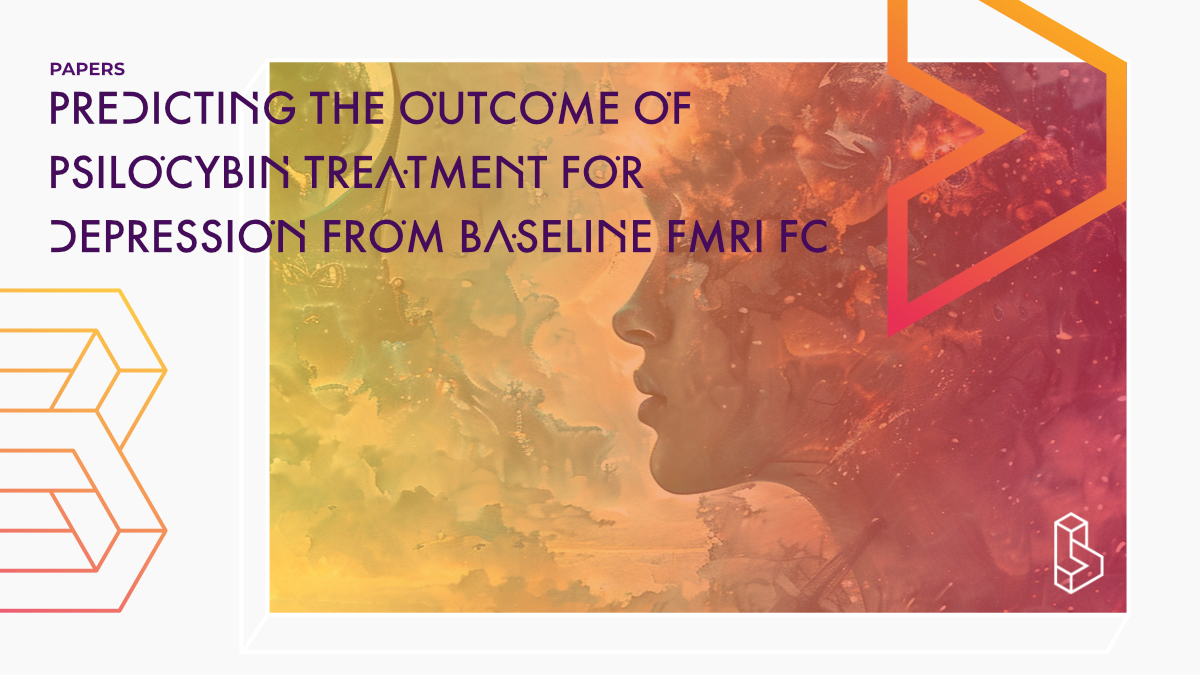This machine learning study (n=16) examines baseline resting-state functional connectivity (FC) measured with fMRI as a predictor of symptom severity in psilocybin-assisted therapy for treatment-resistant depression (TRD). Results show that FC of visual, default mode, and executive networks predicted early symptom improvement, with the salience network predicting responders up to 24 weeks after treatment.
Abstract of Predicting the outcome of psilocybin treatment for depression from baseline fMRI functional connectivity
“Background: Psilocybin is a serotonergic psychedelic drug under assessment as a potential therapy for treatment-resistant and major depression. Heterogeneous treatment responses raise interest in predicting the outcome from baseline data.
Methods: A machine learning pipeline was implemented to investigate baseline resting-state functional connectivity measured with functional magnetic resonance imaging (fMRI) as a predictor of symptom severity in psilocybin monotherapy for treatment-resistant depression (16 patients administered two 5 mg capsules followed by 25 mg, separated by one week). Generalizability was tested in a sample of 22 patients who participated in a psilocybin vs. escitalopram trial for moderate-to-severe major depression (two separate doses of 25 mg of psilocybin 3 weeks apart plus 6 weeks of daily placebo vs. two separate doses of 1 mg of psilocybin 3 weeks apart plus 6 weeks of daily oral escitalopram). The analysis was repeated using both samples combined.
Results: Functional connectivity of visual, default mode and executive networks predicted early symptom improvement, while the salience network predicted responders up to 24 weeks after treatment (accuracy≈0.9). Generalization performance was borderline significant. Consistent results were obtained from the combined sample analysis. Fronto-occipital and fronto-temporal coupling predicted early and late symptom reduction, respectively.
Limitations: The number of participants and differences between the two datasets limit the generalizability of the findings, while the lack of a placebo arm limits their specificity.
Conclusions: Baseline neurophysiological measurements can predict the outcome of psilocybin treatment for depression. Future research based on larger datasets should strive to assess the generalizability of these predictions.”
Authors: Débora Copa, David Erritzoe, Bruna Giribaldi, David J. Nutt, Robin L. Carhart-Harris & Enzo Tagliazucchi
Summary of Predicting the outcome of psilocybin treatment for depression from baseline fMRI functional connectivity
Depression is a mood disorder that can be triggered by environmental factors in interaction with underlying susceptibilities. Major depressive disorder can be diagnosed if at least five symptoms of depression are present for two or more weeks.
Patients with treatment-resistant depressive disorder (TRD) may benefit from electroconvulsive therapy, repetitive transcranial magnetic stimulation, vagus nerve stimulation, and novel pharmacological treatments.
Psilocybin, a classic psychedelic drug, is considered one of the most promising novel treatments for transient recurrent depression (TRD). It is at least as effective for the treatment of depression as escitalopram, with possible superiority in many domains.
Find this paper
https://doi.org/10.1016/j.jad.2024.02.089
Paywall | Google Scholar | Backup | 🕊
Cite this paper (APA)
Copa, D., Erritzoe, D., Giribaldi, B., Nutt, D., Carhart-Harris, R., & Tagliazucchi, E. (2024). Predicting the outcome of psilocybin treatment for depression from baseline fMRI functional connectivity. Journal of Affective Disorders.
Study details
Compounds studied
Psilocybin
Topics studied
Treatment-Resistant Depression
Depression
Study characteristics
Original Re-analysis
Open-Label
Longitudinal
Participants
38
Humans
Institutes
Institutes associated with this publication
University of Buenos AiresUBA is home to the Consciousness, Culture and Complexity & Phalaris Labs. Both labs are led by Enzo Tagliazucchi
Linked Research Papers
Notable research papers that build on or are influenced by this paper
Psilocybin with psychological support for treatment-resistant depression: an open-label feasibility studyThis is the first modern study (n=12) on psilocybin and its effects on treatment-resistant depression (TRD). It shows that two sessions with psilocybin (10mg and 25mg) in combination with psychological support can reduce depressive symptoms over periods of one week to three months after treatment. Psilocybin was well tolerated by all of the patients, and no serious or unexpected adverse events occurred.
Psilocybin for treatment-resistant depression: fMRI-measured brain mechanisms
This within-subjects fMRI study (n=19) investigated changes in brain function before versus after psilocybin (with psychological support) in patients with treatment-resistant depression. After treatment, all patients showed decreased depressive symptoms and changes in brain functioning.
Trial of Psilocybin versus Escitalopram for Depression
This double-blind placebo-controlled study (n=59) compared psilocybin (2x25mg; 3 weeks apart) to escitalopram (SSRI) over a six-week period and found large improvements in depression scores for those suffering from depression (MDD) in both groups. On the main measure of depression, the QIDS-SR-16, there was no significant difference between both groups. The study did find significant differences, favoring psilocybin, on the HAM-D-17, MADRS, avoidance, flourishing, wellbeing, and suicidality.
Linked Clinical Trial
Assessing the subjective intensity of oral psilocybin in patients with treatment-resistant depression: A Pilot Study (PSILODEP-PILOT)This open-label trial (n=12), also known as PSILODEP-PILOT is the first to test psilocybin in patients in the UK. The study found psilocybin (10-25mg, x2) to be well-tolerated.

